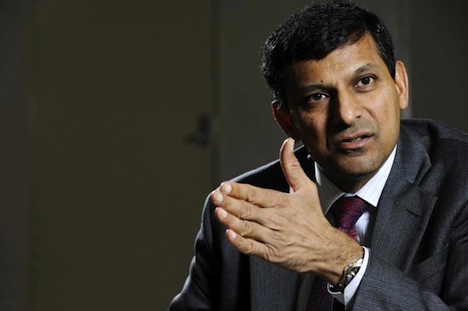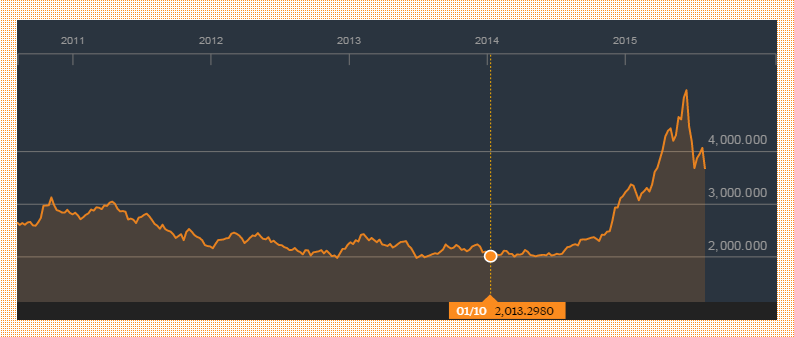
Earlier this week, Indian prime minister Manmohan Singh announced his choice to head the Reserve Bank of India — Raghuram Rajan, a University of Chicago economics professor who’s perhaps best known for cautioning in 2005 that the financial system was headed toward a collapse.
Rajan will certainly face quite a difficult set of problems — notably the sharp decline in the value of the Indian rupee this year.
But when Rajan takes over as RBI governor in September, he will also immediately become one of the chief actors in determining the outcome of India’s scheduled May 2014 national elections. While the world is naturally asking the question, ‘How will Rajan strengthen the rupee?’, it should also be asking, ‘How committed is Rajan to helping Singh’s Congress Party win a third consecutive election?’ and ‘What kind of relationship might Rajan have with prime minister Narendra Modi?’
Rajan will certainly face pressure from within the current government to help ease the economy into the 2014 election, perhaps by lowering the RBI’s bank interest rate from 7.25% to spur growth over the next eight months. But Rajan’s more immediate problem is arresting the Indian rupee’s 12% decline in the past three months, not to prop up Singh’s government, and it’s not even clear that Rajan can do anything to boost growth without exacerbating other problems. Furthermore, Rajan’s long-term interest in liberalizing India’s economy will also give Modi a powerful ally if elected.
India’s current United Progressive Alliance (UPA) coalition government is unpopular and Singh, India’s prime minister since 2004, will cede the spotlight to Rahul Gandhi, a somewhat lackluster fourth-generation member of the powerful Nehru-Gandhi family that dominates the ruling Indian National Congress (Congress, or भारतीय राष्ट्रीय कांग्रेस). One of the reasons that Singh and Congress are so unpopular is the slowdown in India’s economy over the past five years — GDP growth has dropped from a galloping 8.5% in 2009 and 10.5% in 2010 to just 6.3% in 2011, 5.4% in 2012 and an estimated 5% or so in 2013.
Furthermore, Singh has not been as successful as prime minister in enacting the kind of ‘big bang’ liberalization reforms as he was in the early 1990s, when Singh served as finance minister under prime minister P.V. Narasimha Rao. Singh’s push last year to liberalize India’s retail sector and to cut fuel subsidies, met with fierce resistance from just about everyone in India — the political left in his own coalition, including West Bengal chief minister Mamata Banerjee, who withdrew her support from Singh’s government; the political right, which supported reforms when it was in power in the early 2000s; and India’s labor unions and India’s many small shopkeepers. While Singh deserves credit for enacting the retail reforms, they fall far short of what Singh was expected to have accomplished when he took office nearly a decade ago.
Modi is the longtime chief minister of Gujarat, a state that boasts a particularly strong economic record, and he exudes more energy than just about anyone in Singh’s government these days. Modi will lead the conservative, Hindu nationalist Bharatiya Janata Party (the BJP, or भारतीय जनता पार्टी) into next year’s election. Though he remains controversial within India and abroad due to his role in Hindu-Muslim rioting in 2002, he stands a good chance of becoming prime minister. Modi is certainly enthusiastic about further liberalization reform in India, which makes Rajan a natural ally. While there is certainly room for much more liberalization in the Indian economy, there are plenty of protectionist voices within the BJP (many of whom objected to Singh’s retail market reforms), to say nothing of Congress and more leftist Communists in the Indian parliament, who are certain to oppose reform.
Ironically, it could be Modi who finishes the work that Singh-the-finance-minister began.
Also ironically, it could be Singh’s appointment this week that hands Modi a key ally within the central bank to enact more liberalization.
None of that will necessarily matter, however, if Rajan cannot stop the rupee’s plummet in value, which has made it more expensive for India to import oil and other goods. That has created two immediate problems for India’s economy.
Continue reading Raghuram Rajan’s selection as India’s new central bank governor is good news for Modi →

![]()

